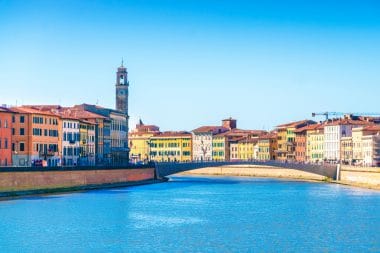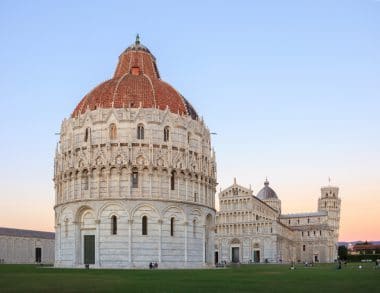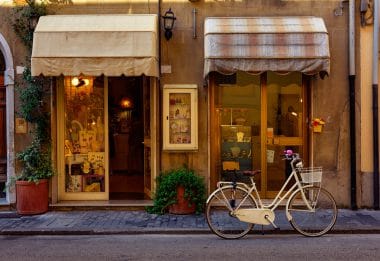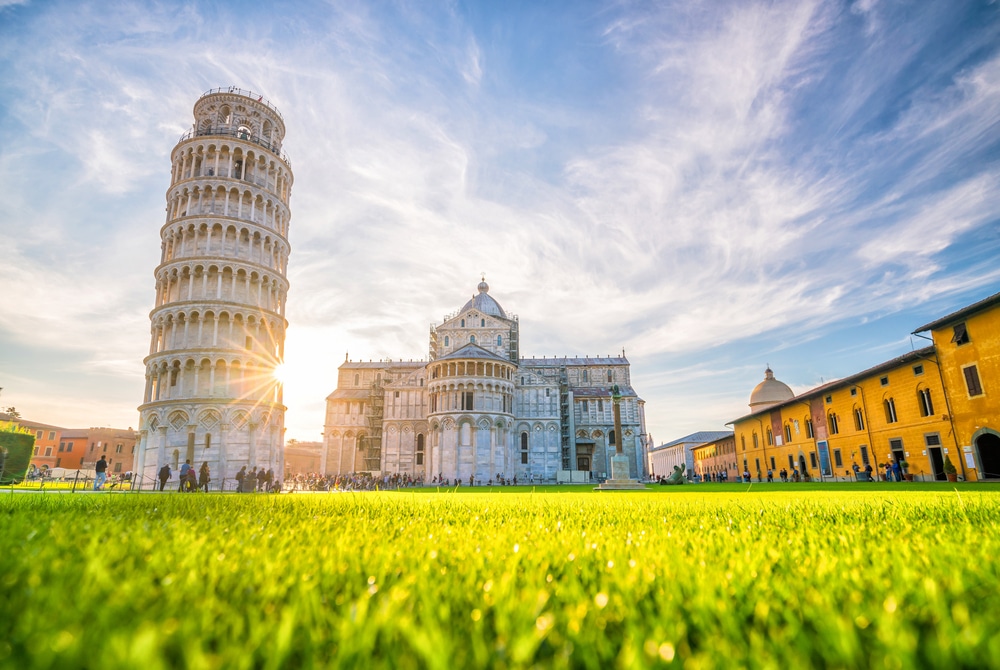260 kilometers north of Rome lies the city of Pisa with 90,000 inhabitants. Due to its location on the Mediterranean, it was an important seafaring republic and attracted traders from all over the world. It became famous for its “Leaning Tower of Pisa”, which developed into one of the biggest tourist magnets in Europe and especially Italy . Nowadays, Pisa is a lively, modern city with a typical Italian flair, with many students who make up almost half of the population.
The city’s landmarks
The most important buildings in Pisa are located in Piazza dei Miracoli, also known as Piazza del Duomo . Here, the Leaning Tower of Pisa, the cathedral, the largest baptistery in the world and a cemetery are close to each other. These four sights were named UNESCO World Heritage Sites in 1987.
Leaning Tower of Pisa

Construction of the free-standing bell tower began in 1173. Twelve years later, it happened that the tower, which had been unfinished until then, tilted by four degrees . The reason for this was a loamy soil that could not withstand the weight. The missing part was then built in such a way that the construction could not sink any further. It reached a total height of 55.8 meters and the Leaning Tower of Pisa was finally opened in 1372.
Duomo di Pisa
The Cathedral of Pisa, also known as the Cathedral of Santa Maria Assunta , was built in the middle of the 11th century in the Romanesque style. In 1118 it was consecrated by Pope Gelasius II. The materials used for the construction were often objects that were captured in previous battles or stolen from the defeated cities. Along with the Cathedral of Florence , it is considered one of the most popular churches in Tuscany.
The Baptistery

The world’s largest Christian baptistery reaches a height of 54 meters and is located not far from the Cathedral of Pisa. On its dome there is a bronze statue of John the Baptist from the 15th century. In addition to the octagonal baptismal font , the acoustics of this church are particularly impressive. Due to the special construction, there are unique sound experiences and echoes inside the building.
Camposanto Monumentale
The Camposanto Monumentale cemetery is also part of the Piazza dei Miracoli and was already used for burials in the Middle Ages. The cloister and the Gothic marble façade that surrounds the cemetery are particularly worth seeing.
Special celebrations in Pisa
Luminara di San Ranieri
Every year on June 16, the feast of the patron saint “San Ranieri” takes place in Pisa. The whole city becomes a unique scene when hundreds of thousands of candles and lights are lit at sunset. Floating lights enchant the Arno River, on which illuminated boats sail. Various concerts take place and the party goes on until late at night. The festivities reach their climax at 11 p.m., when the big fireworks display is ignited.
Regata di San Ranieri
The actual holiday in honour of San Ranieri takes place one day later, on 17 June. In the morning, processions pass through Pisa. You will end in the cathedral, where a large mass will be celebrated. In the afternoon, the annual regatta takes place on the Arno, where the different districts of the city compete against each other in a boat race.
Gioco del Ponte

On the last Sunday of June, the inhabitants of Pisa celebrate the Gioco del Ponte, the “Battle on the Bridge”. In this centuries-old competition, the Tramontana and Mezzogiorno districts compete against each other. The aim of this medieval game is to take the other part of the bridge. A historical procession leads the almost 400 participants, some of whom are dressed in helmets and armor, to the scene. On the Ponte di Mezzo bridge, an attempt is finally made to push a seven-ton cart to the opponent’s side.
Tuscan delicacies
In Pisa you can find all the delicacies typical of Tuscany. Local products from the region, such as meat from pig and cattle breeding or fish from the Mediterranean, dominate the menu. The sciocco, an unsalted bread, is often served with meals. Culinary specialties include olive oil, truffles, wine and the famous pecorino sheep’s cheese. As is customary throughout Italy, antipasti and pasta are offered in almost all restaurants in Pisa.


